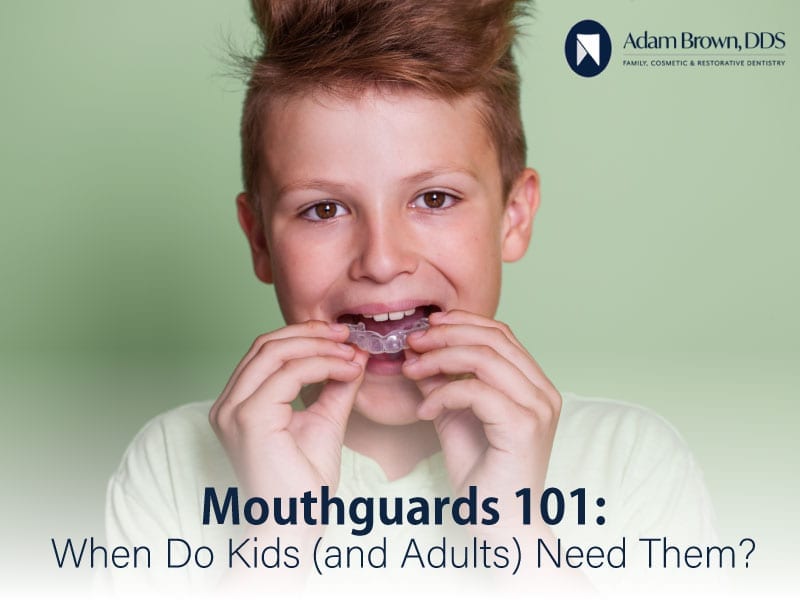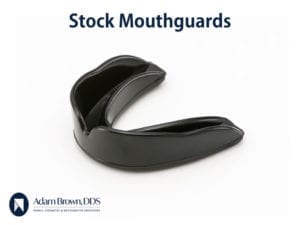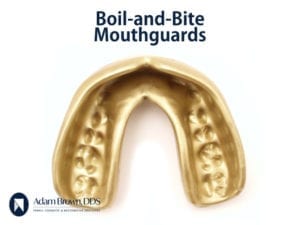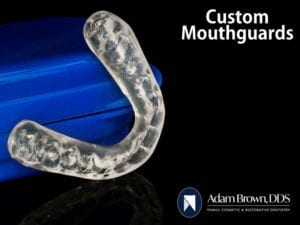Mouthguards 101: When Do Kids (and Adults) Need Them?

If your kid is active in any way, you probably know about the importance of wearing a helmet, knee pads, and goggles. But one protective device that doesn’t get quite as much attention as it should is the mouthguard.
In some kids’ sports, mouthguards are required. However, many sports don’t require them, which makes it easy to underestimate their function or simply forget to have your child wear one. Nonetheless, if your kid is participating in a sport that involves any kind of potential contact—with other individuals, the ground, or objects—then wearing a mouthguard should be part of their daily routine.
Still not convinced? Well, the American Dental Association (ADA) estimates that mouthguards help prevent more than 200,000 dental injuries each year. Moreover, about three-million teeth are knocked out in kids’ sports in any given year! And mouthguards not only help prevent teeth from being knocked out, chipped, or fractured, they can even protect your tongue, lips, and face from injury, as well as help to lessen the impact from blows to the head.
Below, we’ll cover the basics of mouthguards—including the different types, the sports that necessitate them, how both kids and adults can benefit from them, and more.
WHAT ARE MOUTHGUARDS?
Also referred to as a sports guard or mouth protector, a mouthguard is a device worn over the teeth to protect them from blows to the head or face. Along with helping prevent injuries to your teeth, a mouthguard can help protect your face and jaw, as well as the soft tissues of your tongue, lips, and cheek lining. If your kid plays any kind of sport that involves body contact, falls, or moving equipment, they should be wearing a mouthguard at all times while participating.
In most cases, a mouthguard covers only the upper teeth. This is because your upper teeth stick out more, which means they receive the brunt of impact during an incident. The bottom teeth are a little further back, so they are typically safer from harm.
Mouthguards are not only useful for kids playing sports. Adults can also benefit from them, whether they play contact sports or suffer from sleep disorders (which we’ll cover later).
DIFFERENT TYPES OF MOUTHGUARDS
Not all mouthguards are created equally. There are three main types, each of which works well in specific instances: 
Stock Mouthguards
This is the most accessible and cost-effective type of mouthguard, as almost any drugstore or sporting goods store carries them. Typically, stock mouthguards come in small, medium, and large sizes, and they simply fit over the upper teeth.
Stock mouthguards work well if your kid plays contact sports only occasionally. However, whatever you open in the package is what you get. And since they’re not moldable, they usually don’t fit very well, are uncomfortable, and can make speaking difficult.

Boil-and-Bite Mouthguards
Going a step up, a boil-and-bite mouthguard is similar to a stock mouthguard, except you can mold it to your teeth. This makes a big difference. A boil-and-bite mouthguard comes in one size; you mold it by boiling it until it softens, placing it over your upper teeth, and biting down. The mouthguard then dries and hardens to the shape of your teeth. Considering that boil-and-bite mouthguards are just as widely available and almost as inexpensive, they are clearly the better option over stock mouthguards.
Custom Mouthguards
Then there are custom mouthguards. These are more expensive, but they are ideal when it comes to comfort and fit. In short, a dentist will take a mold  of your teeth and fabricate a mouthguard to the exact specifications of your teeth and mouth structures. Kids who play sports regularly can greatly benefit from custom mouthguards, as can adults who deal with snoring or sleep apnea.
of your teeth and fabricate a mouthguard to the exact specifications of your teeth and mouth structures. Kids who play sports regularly can greatly benefit from custom mouthguards, as can adults who deal with snoring or sleep apnea.
SPORTS THAT CALL FOR MOUTHGUARDS
As previously mentioned, your child will likely be required to wear mouthguards while playing certain sports. However, even if the league does not require it, that doesn’t mean your child should not wear a mouthguard. Here is a list of sports for which a mouthguard is necessary:
- Hockey
- Basketball
- Indoor Soccer
- Wrestling
- Skiing
- Snowboarding
- Fencing
- Football
- Gymnastics
- Outdoor Soccer
- Lacrosse
- Volleyball
- Skateboarding
- Raquetball
- Martial Arts
- Baseball
- Softball
It’s worth noting that, along with competitions, mouthguards should be worn in all practices.
BENEFITS OF CUSTOM MOUTHGUARDS
The benefits of getting a custom mouthguard are many, which is why we’ve dedicated a section to explain why you should consider getting your child (or yourself) fitted for a custom mouthguard. Here are a few advantages of investing in a custom mouthguard from your dentist:
Perfect Fit
Even at its best, a stock mouthguard will only fit well enough to stay on your teeth when your mouth is closed. A boil-and-bite mouthguard will fit better than that, but it will still be prone to coming loose, especially if you wear it regularly. That problem is fixed with a custom mouthguard.
A qualified dentist like Adam Brown can have a mouthguard perfectly fitted to your teeth. You’ll simply come in to have an impression taken of your teeth, the cast will be sent to a dental lab, and you’ll come back to the dental office to test its fit. Chances are you’ll leave with a reliable mouthguard that fits snuggly and comfortably.
Optimal Comfort
When a custom mouthguard is fabricated for your teeth and mouth, it’s simply going to be more comfortable than a generic mouthguard. This is especially critical for children. After all, if your child’s mouthguard hurts or irritates them, they will be less likely to wear it of their own volition.
Better Protection
Along with optimal fit and comfort, a custom mouthguard will provide you with more protection than other types. And protection is the whole point when it comes to mouthguards. The reason for this is that a custom impression will account for all the unique shapes and features of your teeth and mouth. For example, if your child has braces, a custom mouthguard will be shaped to accommodate the wires; that way, the wires won’t hurt your child or break during impact.
The Right Thickness
One overlooked attribute of mouthguards is the thickness. How thick your mouthguard should be will depend on what you need it for. For example, if your child is participating in a sport that involves frequent significant impact, such as martial arts, they will need a thicker mouthguard than someone who plays racquetball. Your dentist will discuss with you the activities for which your mouthguard is needed and help you determine the appropriate thickness.
Cost-Effectiveness
Yes, it will set you back more than a stock or boil-and-bite mouthguard, but a custom mouthguard can still prove to be cost-effective. In fact, it can end up being cheaper in the long run. This is for two reasons. First, generic mouthguards found at drugstores and sporting goods stores wear out rather quickly, meaning you have to replace them often. Second, because custom mouthguards are perfectly tailored to your specific teeth and mouth structures, chances of severe injuries and costly procedures are less likely.
OTHER REASONS TO GET A MOUTHGUARD
Mouthguards are essential for kids (and adults) who play sports. But they can also benefit the health and well-being of adults when it comes to snoring and sleep apnea. Let’s discuss how the right mouthguard can help with each of these conditions:
Snoring
Almost everyone snores from time to time. But for some people, it’s a chronic problem that can lead to a wide range of health issues (in addition to being annoying to your partner). For example, snoring can disrupt sleep, which can lead to daytime sleepiness. This, in turn, can lead to difficulty concentrating, hindered productivity, frequent irritability or anger, and/or impaired driving. Snoring can also put you at a higher risk of high blood pressure, heart disease, stroke, and many other health issues.
In the most basic sense, snoring occurs when the soft tissue in your upper airway vibrates. A custom mouthguard can fix this problem. The right mouthguard—one that fits over both the upper and lower teeth—will help to pull your lower jaw forward, which will keep your airway open throughout the night. There are numerous over-the-counter mouthguards that supposedly prevent or reduce snoring. But these types of mouthguards have yet to be proven to work as effectively as custom mouthguards.
Sleep Apnea
Often associated with snoring but much more serious, sleep apnea is a condition that calls for immediate action. In essence, sleep apnea means that your breathing pauses repeatedly throughout the night. Each time you stop breathing, your body wakes up in order to start breathing again. Obviously, such frequent interruptions make it virtually impossible to get restful sleep.
There’s more. Along with making you chronically sleepy, sleep apnea can lead to heart disease, diabetes, obesity, high blood pressure, and a whole host of other health conditions, including:
- Depression
- Memory loss
- Acid reflux
- A weakened immune system
- Asthma
- Liver problems
- Low blood oxygen
- High cholesterol
Much like with snoring, a custom mouthguard can benefit those with mild sleep apnea. By pulling your lower jaw and tongue forward, your airway is better able to remain open during sleep. You can even get a mouthguard that has a strap, which helps to re-adjust your lower jaw. It’s important to note, however, that if you suffer from a more severe case of sleep apnea, then you should ask your doctor about using a CPAP machine in lieu of a mouthguard.
HOW TO CARE FOR MOUTHGUARDS
If you or your child are using a mouthguard, it’s essential that you take the necessary steps to keep it clean and in good shape. Always brush and floss your teeth before wearing a mouthguard, and rinse the mouthguard with cool water before and after each use. To take it a step further, clean your mouthguard with a toothbrush and toothpaste between uses. Be sure to store your mouthguard in a hard, ventilated container so that it can stay dry while you’re not using it. Finally, always be on the lookout for signs of wear so that you will know when to replace it, and let your dentist evaluate it at each visit.
WEARING MOUTHGUARDS WITH ORTHODONTIC DEVICES
Not only can you wear mouthguards when you have braces, dental implants, or dental bridges, but a custom mouthguard can go a long way in protecting both your teeth and orthodontic devices during impact. This is because the mouthguard fits around the unique shapes of your braces, implants, and/or bridges.
INSURANCE AND MOUTHGUARDS
Lastly, check with your dental insurance provider about their policies on custom mouthguards. Some plans will cover some or all of the costs associated with custom mouthguards, and you can also use funds from your health savings account (HSA) to pay for either custom or generic mouthguards. Moreover, some dental offices will provide you with a payment plan if your insurance will not cover the costs.
In Sum
The right mouthguard can do wonders in protecting your child from serious oral injuries when playing contact sports. The same goes for you if you suffer from snoring or sleep apnea as an adult. Be sure to consult your dentist about the type of mouthguard that will best meet the needs of you or your child. And remember, Adam Brown is just a call away if you would like an appointment to get fitted for that custom mouthguard!
